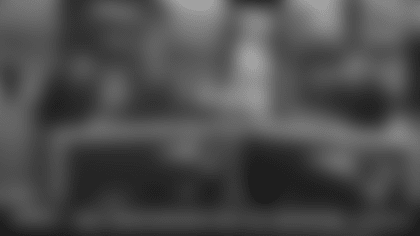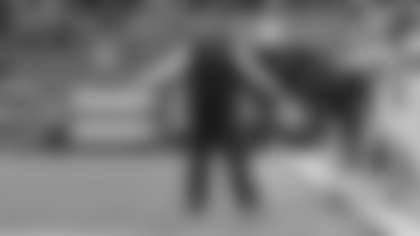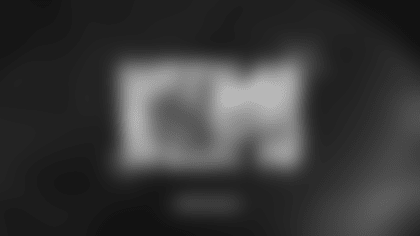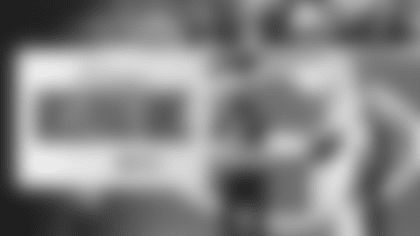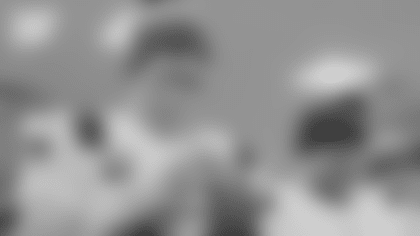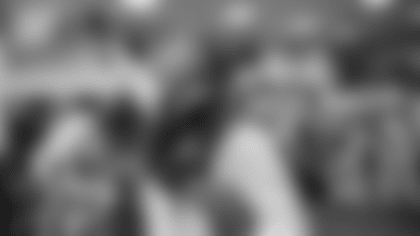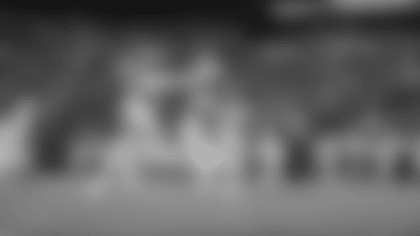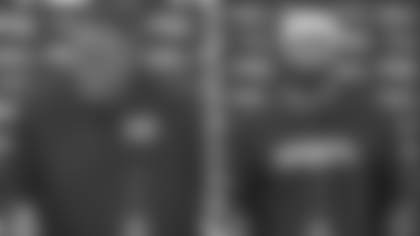New England Patriots head coach Bill Belichick addresses the media during his press conference at Gillette Stadium on Tuesday, September 1, 2009.
BB: OK, so we're in a short week this week and are moving along here on the Giants. As you know, that's a real quality football team there. They really do everything well. [They're] very good on defense, very stout up front, good coverage team, pressure team. They have a bunch of guys that can rush. Offensively, they have a very good running game - several backs that can run the ball. [They have a] good passing game, very experienced offensive line. They don't make many mistakes. [They're] solid in the kicking game, good specialists. Physical team - this is three teams in the NFC East that we've seen quite a bit of film on - I think all three of the better teams in the league. [They have] a lot of talent, [are] physical, well-coached, so this will be another good opportunity for us this week to continue to develop and build on the things that we had the first three weeks in preseason and through the entire training camp. I would expect that the players that played more against Washington will probably play a little less against the Giants and some of the players that didn't play as much against Washington will play more against the Giants. As far as specifics, we haven't really talked about that. That's something that we will take up here tonight and tomorrow. That's kind of the update here.
Q: You made a move yesterday with the long snapper position in releasing Nathan Hodel. What prompted that decision now?
BB: It was, I think, a very competitive situation there. I think both players did a good job. I would expect to see Nate in the league this year. I think he's still a quality player. Let's say the bottom line for us is, we have one preseason game left and we want to let the guys who are going to be together be together, so we could have made that decision after this game, but we felt it was better to make it prior to the last preseason game to give those specialists a chance to work together, just like they would during the regular season and do that one week in advance rather than keep the competition going another week. That's basically the timing of it. It was more of a timing thing. Competitively, it certainly could have gone another week.
Q: Sammy Morris was back out there yesterday in a red jersey. What is his status and what does he have to do to get back out there?
BB: His status as far as what? When it's time to get out the injury reports we'll be all over it. The players that are on the field are doing what they can do. If they are in a red jersey that means they're somewhat limited, but they do what they can do when they're on the field. If they're not on the field then they do what they can do off the field in terms of weight lifting, conditioning, metabolic training, cardiovascular conditioning, technique work on their own or with the strength coaches or trainers. Everybody does what they can do. If they're on the field practicing, then they are practicing. If they're not on the field practicing, then they're doing what they can do up till the point that they can be on the field practicing.
Q: I meant more like his status among the other running backs. He does have a resume, but does he have to show something in the next few weeks?
BB: Well, it's the best thing for every player and for the team - for everybody to be out there doing what they can do. When they can't do that, then they do what they can do and try to get back out there as soon as they can. Practice, repetitions are important for everybody. Unfortunately, we don't have everybody out there all the time, even though we would like to and even though they want to be out there. That's just the reality of it, so we work around it and do the best we can when that's the case. But we certainly want them all out there and that includes everybody. There's nobody that's exempt from that.
Q: Going back to the snapper, you had mentioned in an earlier press conference that there are a couple different elements to the actual snapping and then there's coverage and protection. In Jake [Ingram], what areas did you see improvement of and what areas were he already pretty polished?
BB: I guess I would say both. I think that he was fairly polished in all the areas: long snapping, short snapping, protection, other things in the punting game, on releasing and so forth, and coverage. I also think he's improved in each of those areas. I think his accuracy is better, his protection is better, his ability to play on the line of scrimmage in the punting game, release, help other guys release - that kind of thing - coverage. All those things have improved over the course of training camp, but I think they were also, in relative terms, fairly well along or we probably wouldn't have drafted him if we felt that we hadn't seen them and had to develop them all. I don't know if that makes any sense, but it makes sense to me. It probably doesn't make any sense to anybody else. But I think he's along to a point…He's further along now than he was four weeks ago, five weeks ago - whatever it was.
Q: Can you talk about Kevin O'Connell and why you released him now and will you be looking at another quarterback?
BB: Well, it's kind of the same thing. I think that we felt like we wanted to give the repetitions to the quarterbacks that were here. We have one week left in training camp. It's a short week for the Giants game and we want to give the reps to the players that are here, and so that's what we're going to do. Kevin was put in a position last year because of some circumstances. I think he's worked hard. I think he's a very athletic player. I think football's important to him. I like a lot of things about Kevin. Unfortunately, it just didn't work out here and we've got to do what's best for the team, but there's not a lot of things that I could say to him, 'Well, you know if you would have done this differently' 'If you would have done that differently'. We gave him the opportunities that we could and we evaluated what we saw from our players and we made decisions based on that. I don't really have any other way to put it.
Q: Would you be interested in adding someone at quarterback who has more experience?
BB: Well, right now the players that are here are here. Those are the players that we're coaching, working with and certainly prepared to play with those players and get them ready to play our schedule. Does that mean…Am I saying there's going to be no more player movement? No, I'm not saying that. Could something happen at any position? Yeah, it could. And there're conversations about personnel like we've already seen this year, whether it's Derrick Burgess coming to this team or Russ [Hochstein] and Le Kevin [Smith] going to another team, or whether it's players being released from our team or being picked up by our team like Rob Ninkovich, as an example. Could that continue to go on? Sure it could. Will it? I don't know. Obviously, we're going to have to release players to get to 53, but what our final roster makeup will be - I can't tell you right now. I really don't know.
Q: What has Andrew Walter showed you that has kept him here?
BB: Well, Andrew came into the process kind of late. He missed the spring and the early part of training camp. I think that we want to give him a fair opportunity to pick things up. He's improved in a lot of areas. It's a new offense for him and he's worked to get those things down and try to execute our offense. There's some new learning going on there. There're some things that we've asked him to do that he hasn't had a chance to do yet or he's only had a chance to do them one or two times and maybe - certainly - not in all the situations that he could see given all the coverages that we face. We want to continue to work with him.
Q: Do you feel that with Kevin O'Connell, some of his strengths didn't fit in this offense?
BB: Again, I don't know that that's the case. I wouldn't be surprised if Kevin played in this league with another team and another offensive system. I can't evaluate that. I can only evaluate what we saw Kevin do here and the opportunities that he had here. We've never seen him play with another NFL team, so how that would go, what he would do in another system - I don't know. But he's a pretty talented kid. I'm sure that there are other teams in the league that would like to work with him. One of the things that's working against Kevin, right now, unfortunately, is the fact that he's not practice squad eligible, which is kind of an aberration in the rules there because he probably didn't play 10 plays total the entire season last year, but lost his practice squad eligibility. Then there're other players who, because of the way the rules are, have played a lot more than that and are practice squad eligible. In terms of developing a quarterback, if the player is not practice squad eligible, then he's either got to make it or not make it. There's really no middle ground. That's probably something, overall, that's not in Kevin's favor. That's just the way it is.
Q: In New York you had a linebacker, Carl Banks, that was very good covering the tight ends. It seems now in the league finding that linebacker is a challenge. Can you talk about that challenge?
BB: I think Carl Banks, of all the players that I've coached, was probably better at playing over at tight end than anybody else. Certainly, in the running game he was extremely good at playing against tight ends and the blocking schemes that go on the tight ends side, which are multiple because there's an extra guy over there and that's what the tight end position does. It creates an extra blocker, an extra gap and an extra other combination of schemes. As far as pass coverage on the tight ends, he wasn't really asked to do that all that much in New York. I'm not saying he didn't do a good job of it at times, but that wasn't really a big specialty of his and I wouldn't say, to my recollection, there were all that many times he was asked to do it. I think there were a couple game plans that he was, but I would say probably in 16 games that might of come up once or twice a year at the most. Having a linebacker who can cover a real good pass receiving tight end, it's pretty unusual to see that in this league. Certainly, some guys are better than others, but it's a tough matchup against a real good receiving tight end. If you put a defensive back on him, then the tight ends have a size advantage, a lot of times, 20, 30, 40, 50-pounds - depending on how big the [defensive backs] you put on them [are]. And usually when you put linebackers on those real athletic receiving tight ends, they have significant speed and quickness advantages and that's why tight ends are hard guys to match up on. You've got Tony Gonzalez, just to pick a name, it's almost impossible for any team to matchup with a player like that. He's just got size skills against [defensive backs] and speed and quickness skills against linebackers. On top of that, he's a great route runner with great hands, so even if you're on him it still might not be good enough. That's a hard position to matchup against.
Q: With Tedy Bruschi's retirement it alters the landscape of the linebackers. Who does it create an opportunity for and how will that change things?
BB: Well, that's an interesting question and I don't know the answer to that exactly. I think it's a combination of things. There're a number of jobs that linebackers do, collectively as a group: first down, second down, third down pass rush, third down coverage, kicking game, and so that opens up a number of possibilities. Whether there's one person to replace another person, that may or may not be the case, or you might have somebody who's currently on the roster do something and somebody else do something else, or morph into another set of opportunities or roles, and that could come from either side of the ball. You could have tight ends, you could have backs, you could have possibly receivers, just like you would have linebackers or possibly safeties fulfill some of those roles, depending on what they are. As a first down run linebacker? No. But in the kicking game on third down, those other roles could come from different spots. I think that's in the final analysis when you put together your roster that you think about. You say, 'OK, these are the jobs that need to be done and who could do them?' 'Who can be the gunner on the punt team?' 'Who can be the front row guy on the kickoff return team?' - who does those roles? Then when you figure out which players those are, you say 'this player gives us the most value here or there, whatever it happens to be. In the end, the biggest thing for your team is to be able to fill all your jobs. If you have three or four guys that do the same thing - you have three or four guys that all have the same role on offense or defense - then what differentiates them? It's probably what else they can do in the kicking game or another phase of the game.
Q: Can you assess the leadership void left by Tedy Bruschi's retirement, or is that not really possible?
BB: Yeah, well Tedy's pretty special, a pretty special guy, so I don't think anybody is going to replicated him any more than really I would have thought a couple years ago that somebody would come in and replicate Troy Brown. But you have a combination of players, and every single team has its own chemistry, its own leadership, its own dynamics within the team. Even if you have the exact same people from one year to the next, still there would be something that would be different in the next year. I don't know, it would be something; somebody would emerge, the roles would change somehow or another and there'd be a little bit different set of dynamics. That's always the case, so how this team develops its personality, leadership, how it integrates, the chemistry of the team is something we'll all have to see. It's not something that can be legislated by a coach. I can't sit there and say, 'Well, you two guys are going to be friends, you are going to be the leader of these three guys, you're going to be the leader of this group, you guys are going to do this.' That's something that a team evolves into, and it's not a straight line. It's not necessarily from point A to point B. Sometimes that happens through circumstances or just the growth of in individual or how the team perceives it. It will be interesting to see how that happens. It's interesting every year, not just at this position or with this particular situation. We don't always have the same captains each year. Sometimes you do, sometimes you don't, but sometimes even the leadership role within the team - even if the captains are the same or they're sitting on the same side of the ball - changes from year to year or throughout the course of the year.
Q: With one preseason game left, is there anything players can do to force their way on to the roster or have they already shown you enough to make your decision?
BB: I think there're a number of things that we'll see more evidence of this week, not only evaluation of players, but also evaluation of different roles on the team. We'll see matchups against different types of players with the Giants than we saw with the Redskins or the Bengals or the Eagles. That's just natural because there're certain players the Giants have that are just a little bit different than some of the guys we've faced. That will help our evaluation process, and also the ability of players to play a specific role and to play a play or two [or] to play in a particular situation versus the ability of a player to play over an extended period of time. As I said, we evaluated a number of players last week in the Washington game playing upwards of 40 plays, but we definitely couldn't do that with everybody. This week we'll look at some other players playing maybe in that neighborhood of playing time, so I think there're a lot of things that we can find out and will find out, not only in the game, but in these couple days of practice. In the end we'll just try to put it together the best we can.




